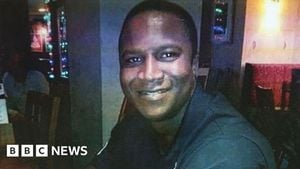Internal emails obtained during litigation have unveiled the New Orleans Saints' extensive involvement in assisting the Catholic Archdiocese of New Orleans amid its longstanding clergy sexual abuse scandal. These communications display how team executives engaged weaponry of public relations not merely as supportive allies but as active participants steering narratives aimed at minimizing damage to the church's image following damning allegations.
The scandal reignited public outrage following the release of lists detailing clergy accused of sexual misconduct, most pressing when one was tied to charges of raping an 8-year-old boy. The Saints, who have long boasted connections to the Archdiocese through ownership of the franchise, became intricately woven with efforts led by church leaders, particularly Archbishop Gregory Aymond, to confront this crisis.
From 2018 to mid-2019, emails disclosed by the Associated Press and other media outlets reveal insights through the lens of those directly involved. Saints executives, including President Dennis Lauscha and Senior Vice President Greg Bensel, were documented providing advice and public relations strategies to the church.
One telling email detailed Lauscha briefing his superior on discussions with Leon Cannizzaro, the New Orleans district attorney at the time, hours before the church released its infamous list of credibly accused clergy members. Apparently, this conversation permitted adjustments to the names released, inviting fresh concerns about the integrity of the disclosures made by the church.
“We need to tell the story of how this Archbishop is leading us out of this mess,” one Saints executive urged amid addressing dire public scrutiny. These actions are being viewed under the new light of the emails, which contradict earlier claims by the Saints organization stating they had provided merely “minimal” assistance.
State Representative Mandie Landry expressed her disgust, questioning why the Saints would go to such lengths to continue supporting figures involved in heinous acts against children. “This is disgusting,” she stated, calling the Saints' involvement incomprehensible to any conscious citizen. “Why protect adults who abused children instead of the victims?”
Kevin Bourgeois, who endured abuse at the hands of clergy and once held season tickets for the Saints, echoed similar feelings of betrayal, stating, “We felt betrayed by the organization. I’m angry, hurt and re-traumatized.” For many, this inquiry raised more questions than answers about the ethical alignment and accountability of the Saints.
Growing up as Catholic, Bourgeois expressed disbelief at the organization’s actions. He remarked, “It forces me to question what other secrets are being withheld.” The resurfacing of these emails severely tarnished the public perception of not only the Archdiocese but also the organization once heralded for its community engagement. What was once thought to be isolated incidents of misconduct are now exposed, leading to revelations about systematic failures of accountability.
While Bensel maintained during correspondence with media outlets his commitment to separating his roles, stating, “I am writing this email not as the communications person for the Saints/Pelicans but as a parent, New Orleanian and member of the Catholic Church,” his communications indicated much to the contrary. His layered relationship with church officials and media suggested overwhelming collaboration.
Beyond the communication facilitation, details emerged illuminating how deeply intertwined their strategies became. For example, Bensel aided Aymond via crafting potential responses to media inquiries, asserting the church should present the utmost transparency, carefully guiding the discussion without explicitly supporting victim's rights through the legal system.
The 276 pages of leaked emails exhibited public relations perspectives downward, portraying the respective Saints’ public personas to align with the Church’s declining reputation. Unsurprisingly, the optics worsened as the media relations evolved to shape narratives favorable to rectifying church credibility during explosive moments.
Numerous collaborations involving the Saints and local media institutions illustrated the network of shared interest amid this crisis. U.S. District Judge Jay Zainey, known for cheering on the Saints, played his own part by supporting strategies developed by their communications team — highlighting institutional ties forged within New Orleans politics.
While Saints officials have made clear their disaffection with prior discussions to undergoing public scrutiny, they remain defensively poised against allegations of collusion with church leaders to sidestep accountability and bolster damaging reputations.
Sports teams and institutions often exist within community confines, blurring distinct lines of authority and ethical boundaries. So for fans and victims of abuse, the fallout from these revelations may validate long-held suspicions of complicity and ethical compromise.
Current circumstances prompt the necessity for far-reaching accountability, and hearken to confrontations within the Catholic Church. Public denouncement and awareness lead to reconsiderations of long-standing allegiances — both to faith and local institutions.
Whether the Saints will weather this storm relies heavily on viewer expectations and societal shifts toward demanding accountability from leaders on all fronts. Only time will tell if this scandal transforms the operational norms of public trust and relational ethics practiced by influential organizations such as the New Orleans Saints.



